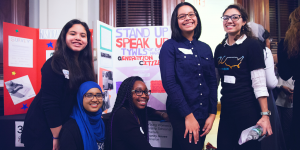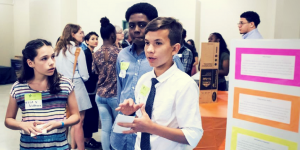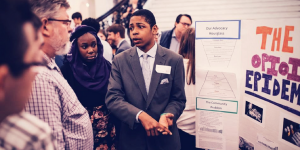Generation Citizen is a nonpartisan, 501(c)3 tax exempt organization which does not endorse candidates; our goal is to engage our staff, participants, and stakeholders in political and civic action on issues that matter to them personally and in their communities. The opinions expressed in this blog post are those of the writer alone and do not reflect the opinions of Generation Citizen.



There is sometimes a reflexive tendency when witnessing young people in action to express something akin to “Seeing this work made me so hopeful about the future!” I have heard this sentiment expressed again and again from those who attend a Generation Citizen Civics Day, our semester-end event, in which our students present the issues they have taken action on to community members and elected officials. Especially in present times, when so much in the world seems in constant tumult, Civics Day seemingly presents both a reprieve and hope for a better future. The idealism of young people is a welcome balance to the cynicism that increasingly pervades our politics.
This semester, I had the opportunity to attend four of our six Civics Days, including those in our brand new sites of Central Texas and Oklahoma City. I saw students passionately discussing the nuances of state budgets, city council resolutions, and department regulatory policies. I was inspired. I was moved. And I was also deeply frustrated that young people are being forced to grapple with unjust structures seemingly beyond their control, that all too often do not take their opinions or experiences into account.

The last Civics Day this semester took place in Austin, Texas. As I walked into judging rounds, I gravitated towards a group of high school seniors who had taken action on immigration policy in Texas. They had chosen to advocate against Senate Bill 4, a proposed state law that would essentially outlaw sanctuary cities, a heated topic of debate in a climate ripe with increased deportations. While deportations have obviously become a national topic, Austin occupies a unique space in the debate. The city itself is immigrant friendly, in a state that is decidedly not. The city had been specifically targeted in ways I had not seen in our other, more left-leaning states. The legislature essentially wanted to give Austin a civics lesson in the power of state policy.
The students recognized this dynamic. They had witnessed fellow students targeted, families deported, and ICE agents in increased circulation. They told me they had previously been apathetic, but this topic moved them to action. They were passionate about ensuring that fellow students knew their rights, and they tried everything they could to push back against this bill. They called their legislators. They circulated petitions. They helped to organize and attend rallies. They did everything we told them to do to be an effective, engaged, active citizen.
They lost. The bill passed.
My own thoughts on the bill are irrelevant here, and GC is a non-partisan organization. But talking to these students made me recognize the difficulties and challenges of encouraging young people to become politically active, especially in this terrain. In a democracy, you can do everything right: you can understand policy complexities, organize others, contact the right people, make your voice heard. You can do all that, and lose. In essentially every other subject in school, there is a right answer, and there is a wrong answer. In democracy, the right work does not equate to the right solution. In a sense, the process is the only constant, but it is difficult to pretend that the result does not matter.
I asked these students how they reacted to the bill passing.
“We got to keep at it. We have no choice. We’re activists for life.”
That is the right answer. But it’s also a sobering answer, because, as aforementioned, it does not necessarily lead to success.
Throughout Civics Days, and the semester of GC overall, I saw so many young people taking action on such important issues. Police-community relations in New York City. Unsafe water in Norman, Oklahoma, food deserts in Providence, Rhode Island. In some cases, classes were successful. They met with legislators, convinced them to co-sponsor pieces of legislation, established food pantry programs, pushed for a Bill of Rights for homeless populations.
But many of the times, the larger problems remained. Art classes were still gone in Oklahoma City because of large budget cuts. Classmates’ parents could still get deported in Austin. The fossil fuel factory might still get built in Rhode Island.
We at GC are adamant that the process matters more than the result. We know the change students affect in one semester rarely represents an ultimate, lasting solution to the problems they tackle. Especially in our democracy today, we need sustained action from an informed citizenry.
But going to Civics Days made me realize the problematic nature of purely celebrating the process of change when outcomes can be so fleeting. Like so many things in our democracy, it is important to hold two truths at once: educating young people to be actively and engaged citizens is incredibly important. And teaching young people to be excited about a topic that is so complex, and takes so much time, is really hard.
So, as our semester concludes, I am so proud of our students. I was inspired by their action. I was moved. I was uplifted. I was also frustrated. Moved to tears by student speeches.
Most of all, I am resolute that this work is urgent. I am invigorated to push for more. And perhaps that’s more important than solely being hopeful.



